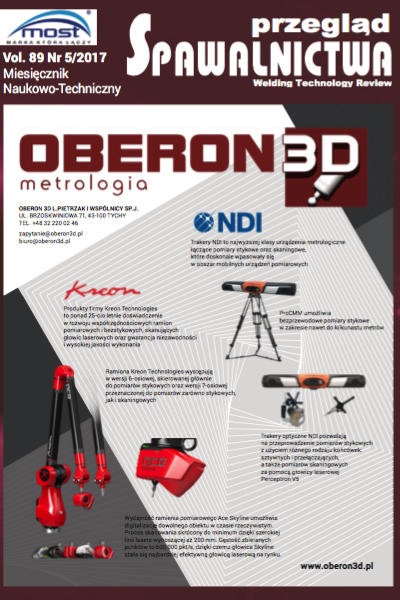Remelting of Inconel 713C alloy by laser and plasma arc
Main Article Content
Abstract
Inconel 713C precision castings are used as aircraft engine components exposed to high temperatures and the aggressive exhaust gas environment. Industrial experience has shown that precision-cast components of such complexity contain casting defects like microshrinkage, porosity, and cracks. This necessitates the development of repair technologies for castings of this type. This paper presents the results of metallographic examinations of pad welds on the Inconel 713C nickel-based superalloy, made by laser and by plasma-arc pad welding. The pad welding process was carried out on model test panels in order to determine the technological and material-related problems connected with the weldability of the Inconel 713C alloy. The studies in- cluded analyses of the macro and microstructure of the pad welds, the base materials, and the heat-affected zones. The results of the structural analyses of the pad welds indi- cate that Inconel 713C should be classified as a low-weldability material. In the pad welds made by laser, cracks were identified mainly in the heat-affected zone and at the melted zone interface, where pad weld crystals formed on par- tially-melted grains. Cracks of this type were not identified in the pad welds made using the plasma-arc method. It has been concluded that due to the possibility of manual pad welding and the absence of welding imperfections, the technology having the greater potential for application is plasma-arc pad welding.
in polish
Przetapianie laserowe i łukiem plazmowym odlewów precyzyjnych ze stopu Inconel 713C
Odlewy precyzyjne ze stopu Inconel 713C znalazły zastosowanie na elementy silników lotniczych pracujących w wysokich temperaturach oraz w agresywnym środowisku spalin. Praktyka przemysłowa wykazała, że w procesie odlewnia precyzyjnego, tak skomplikowanych elementów, pojawiają się wady odlewnicze w postaci rzadzizn, porowatości oraz pęknięć. Powoduje to konieczność opracowania technologii naprawy tego typu odlewów. W pracy przedstawiono wyniki badań metalograficznych napoin na nadstopie niklu Inconel 713C, wykonanych laserem oraz za pomocą napawania plazmowego. Proces napawania prowadzono na modelowych płytach próbnych, w celu określenia problemów technologicznych i materiałowych związanych ze spawalnością stopu Inconel 713C. Badania obejmowa- ły analizę makro i mikrostruktury napoiny, materiału rodzimego i strefy wpływu ciepła. Wyniki badań strukturalnych obszarów napoin wskazują, że stop Inconel 713C należy zaliczyć do materiałów trudno spawalnych. W napoinach wykonanych laserowo ujawniono pęknięcia materiału głównie w strefie wpływu ciepła oraz na linii wtopienia, gdzie na nadtopionych ziarnach krystalizują kryształy napoiny. Tego typu pęknięć nie obserwowano w napoinach wykonanych plazmowo. Stwierdzono, ze względu na możliwość ręcznego napawania oraz brak niezgodności spawalniczych, technologią o większym potencjale zastosowania jest napawanie plazmowe.
Downloads
Article Details
Creative Commons CC BY 4.0 https://creativecommons.org/licenses/by/4.0/
Welding Technology Review (WTR) articles are published open access under a CC BY licence (Creative Commons Attribution 4.0 International licence). The CC BY licence is the most open licence available and considered the industry 'gold standard' for open access; it is also preferred by many funders. This licence allows readers to copy and redistribute the material in any medium or format, and to alter, transform, or build upon the material, including for commercial use, providing the original author is credited.
References
http://www.bibusmetals.pl/fileadmin/editors/countries/bmpl/Data_she- ets/Inconel_600_karta_katalogowa.pdf (08.07.2016)
S. Kocańda: Poradnik Inżyniera Mechanika. Tom 1, WNT, Warszawa 1968.
F. Mastromateo, F. Mammoliti, M. Giannozzi, M. Romanelli, D. Ficorilli: Metal temperature map determination of a serviced gas turbine bucket and comparision with FEM temperature distribution. Proceedings of ASME Turbo Expo 2006 Power of Land, Sea and Air; May 811, 2006, Spain, Barcelona (2006).
F. Zupaniĉ, T. Bonĉina, A. Kiržman, F. D. Tichelaar: Structure of continuously cast Ni-based superalloy Inconel 713C. Journal of Alloys and Com- pounds 329 (2001) pp. 290297.
A. Ges, H. Palacio, R. Versaci: Inconel 713C Characteristic properties optimized through different heat treatments. Journal of Material Science, Vol. 29 (1994) pp. 35723576.
https://www.nickelinstitute.org/~/media/Files/TechnicalLiterature/Alloy713C_337_.ashx (08.07.2016)
A. Szczotok, B. Kościelniak:Characterization of IN713C superalloy microstructure after high temperature creep test by LM, SEM and STEM, Inżynieria Materiałowa, Vol. 2 (2016) pp. 5058.
K. Łyczkowska: Struktura przetopień odlewów precyzyjnych ze stopu Inconel 713C, XLIV Szkoła Inżynierii Materiałowej, Kraków Rytro 2016.
E. Tasak, Metalurgia spawania, Wydawnictwo JAK, Kraków 2008.
